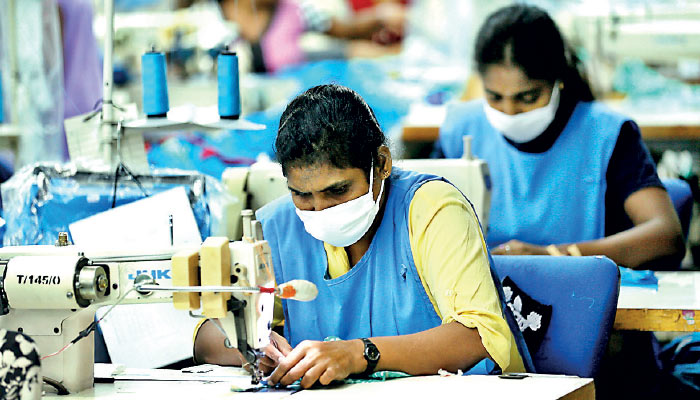Tuesday Feb 24, 2026
Tuesday Feb 24, 2026
Friday, 11 July 2025 01:16 - - {{hitsCtrl.values.hits}}

The US alone imports over $ 1.5 billion worth of Sri Lankan apparel annually, making it the industry’s largest market
 Trump’s proposed 30% tariff on Sri Lankan exports, set to take effect on 1 August 2025, threatens to derail the island’s early-stage economic recovery. As Sri Lanka navigates a post-crisis macroeconomic transition, this impending tariff shock exposes the country’s structural trade vulnerabilities and overdependence on Western markets.
Trump’s proposed 30% tariff on Sri Lankan exports, set to take effect on 1 August 2025, threatens to derail the island’s early-stage economic recovery. As Sri Lanka navigates a post-crisis macroeconomic transition, this impending tariff shock exposes the country’s structural trade vulnerabilities and overdependence on Western markets.
After years of currency volatility, sovereign default, and foreign reserve depletion, Sri Lanka is finally beginning to see daylight. Inflation is slowing, investor sentiment is cautiously improving, and international confidence in its IMF-led reforms is growing. Yet, just as the country takes its first breath of stability, a protectionist storm brews — thousands of miles away — with the potential to choke its fragile recovery.
US President Donald Trump has announced a revised tariff regime targeting countries he deems as unfair trade beneficiaries. Sri Lanka, surprisingly, finds itself in the crosshairs with a steep 30% import tariff on its goods entering the US. Alongside Algeria, Iraq, and Libya, Sri Lanka now faces a significant erosion of price competitiveness — especially in its largest export sector.
Garments and textiles, which account for nearly 40% of Sri Lanka’s total export revenue, are the most immediately vulnerable. The US alone imports over $ 1.5 billion worth of Sri Lankan apparel annually, making it the industry’s largest market. Factories in Katunayake, Avissawella, and Biyagama — the nerve centres of Sri Lanka’s apparel trade — operate within thin profit margins and highly price-sensitive global value chains.
A 30% duty could mean the difference between survival and shutdown. For example, a $ 25 blouse from Sri Lanka would cost a US buyer $ 32.50. Retailers are unlikely to absorb that increase — they may shift sourcing to Bangladesh (with duty-free GSP access) or Vietnam (via CPTPP advantages).
This is not merely a trade issue. It is a labour market disruption. The apparel industry employs over 350,000 workers, many of them women from economically vulnerable communities. A sudden drop in orders would hit their livelihoods and widen regional income disparities.
Sri Lanka’s exports are moderately diversified, but many sectors still rely on the US. Ceylon Tea, rubber-based industrial goods, activated carbon, and even emerging ceramic exports could face market exits or buyer renegotiations under the new tariff landscape.
Meanwhile, Sri Lanka’s terms of trade, already under pressure due to volatile commodity prices and freight costs, could worsen — eroding current account stability and increasing dependence on short-term capital inflows.
The timing of this proposed tariff shock compounds its damage.
Sri Lanka, post-2022, has been executing a painstaking recovery process under IMF surveillance. Key milestones include:
However, this fragile progress remains highly sensitive to export performance and dollar inflows. Any contraction in trade revenue will strain foreign reserves, limit monetary space, and threaten sovereign credit rating upgrades that are beginning to materialise.
This move also raises questions about US-Sri Lanka bilateral ties and Washington’s shifting posture toward South Asia. Whether this is a geopolitical signal — possibly linked to Sri Lanka’s growing openness to Chinese investments — or purely economic retaliation is unclear. But what is clear is this: Sri Lanka has very little room to absorb such shocks without structural rethinking.
This moment demands both strategic diplomacy and domestic economic recalibration:
1.Trade diplomacy: Swift engagement with US trade representatives to advocate for exemption or reduction under mutual trade principles.
2.Market diversification: Deepen ties with the EU (via GSP+), India (via ETCA), and ASEAN markets through bilateral frameworks.
3.Export sophistication: Move from basic garments to higher value-added products, digital services, and branded consumer goods.
4.Investment in technology and ESG: Shift toward more sustainable, certified, and tech-driven exports to attract premium markets.
In economics, timing is everything. For Sri Lanka, this proposed tariff comes not in a moment of strength, but in a narrow window of recovery. The country’s resilience will now be tested — not only in weathering the storm, but in using it as a catalyst for transformation.
The lungs of the Sri Lankan economy have only just begun to inhale again. We must not allow geopolitics and global trade tensions to take that breath away.
(The writer has over 25 years of experience in the banking and financial management sector and is a resident in the United Kingdom. He could be reached via email at [email protected].)